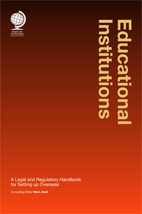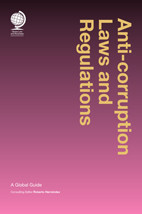
Consulting editor(s): Mark Abell
Publication date: Apr 2018
Format: Hardback
Pages: 298
Price: £138.00
ISBN: 9781787420878
How our eBook platform works
How permanent access, multi-user eBooks work
Add to basket (UK and Europe)Click to buy (USA, rest of world)
Add to basket (UK and Europe)Click to buy (USA, rest of world)
This book is an invaluable tool for any educational establishment considering expanding internationally. Having gone through the experience myself I can confirm that the book covers a wide range of legal and commercial issues that need to be taken into account by any educational institution as it plans and executes its international strategy. This is a timely and sage publication from the UK’s leading experts on the international expansion of schools and other educational institutions. It is an essential part of a tool kit as an institution looks to expansion overseas.
,
With growing numbers of independent schools (pre-school, primary and secondary), vocational colleges and universities seeking to establish themselves internationally, this new text focuses on the complex legal and regulatory requirements of setting up an educational institution overseas.
As these institutions expand into the global arena – where there is a preference for adopting the UK model, supported by government contracts and foreign investment – traditional advisers to the independent education market increasingly need to understand the multi-disciplinary aspects of setting up abroad. Therefore, this book will make essential reading for all lawyers, accountants and school governing bodies involved with international expansion. Private equity investors, who need to understand the due diligence process specific to this sector and the structuring of their partnerships with potential ‘sister schools’, plus commercial property and real estate consultants involved in the actual building of overseas institutions, will also find this book invaluable.
The content examines market viability, the challenges of managing an international educational business, business plans, sustaining relationships, IP issues, data protection, international employment matters, tax considerations, brand protection and corporate structure. There is also a detailed country-by-country comparative analysis which is intended to inform the decision as to where to set up an educational establishment overseas. The text is further enhanced by numerous case studies.
In summary, this comprehensive handbook will provide a trusted guide for legal and business markets to the risk profiling, structural analysis and regulatory compliance issues that face all educational organisations seeking to establish themselves internationally.










